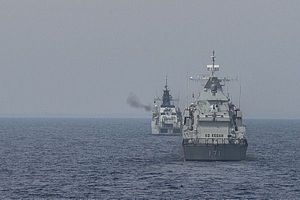On Monday, after much anticipation and several delays, Indonesia, Malaysia, and the Philippines finally jointly and publicly launched trilateral patrols in Tarakan, Indonesia. The move is yet another sign of progress for an indigenous minilateral initiative that holds promise in spite of the lingering challenges it faces.
As I have noted before, the three Southeast Asian states had pledged to undertake trilateral patrols in the Sulu-Sulawesi seas – long a hub for transnational organized crime and terrorist threats – following a meeting in Bali last August. (See: “Confronting Threats in the Sulu-Sulawesi Seas: Opportunities and Challenges”).
The move was hailed as an example of an indigenous, minilateral security arrangement within Southeast Asia, following the Malacca Strait Sea Patrols (MSSP) that had been set up by in the 2000s initially involving Indonesia, Malaysia, and Singapore, and later Thailand too.
Yet despite some progress, fully and publicly operationalizing the patrols has been unsurprisingly slow to take off due to several reasons, ranging from the very threats that the patrols are aiming to mitigate to more mundane rationales like the logistics of getting the ministers of the countries together and specifics related to the launching process itself (See: “Trilateral Patrols in the Sulu Sea: Still Coming Soon?”).
On Monday, the three countries announced the launching of the Trilateral Maritime Patrol (TMP) “Indomalphi” – a rather unwieldy name, which was adopted because it incorporates the beginning part of each of the three countries’ names – in Tarakan. The launch saw a series of military maneuvers involving ships and aircraft, a ceremony on board an Indonesian naval vessel attended by all three defense ministers and military chiefs, and a series of addresses and statements.
With the region consumed by the growing threat posed by the Islamic State in the southern Philippines as evidenced by the Marawi conflict over the past few weeks, all three sides were keen to highlight the arrangement’s significance in not just the Sulu Sea, but in the context of the terrorism challenge in Southeast Asia more broadly.
In terms of the future outlook for TMP beyond the launch, the general architecture has already been laid out, with a network of naval patrols and rotational air patrols supported by arrangements between the countries including on information-sharing and communications as well as three Maritime Command Centers (MCCs) in Tarakan, Tawau, and Bongao and a joint operations center. More collaboration is expected to further boost familiarization of personnel, assets, and process.
But as I noted recently, officials from the three sides have also wisely left room open for the initiative to broaden in terms of its scope and even membership given both the future potential and lingering challenges (See: “Sulu Sea Trilateral Patrols in the Spotlight at 2017 Shangri-La Dialogue”). The presence of Singapore and Brunei as observers was notable in this respect. The former’s involvement was particularly significant because of its membership in the MSSP in the 2000s as well as its Information Fusion Center (IFC) in Changi Naval Base, which, since its establishment in 2009, has become a crucial hub for strengthening multinational and interagency cooperation to counter a range of maritime security threats.

































